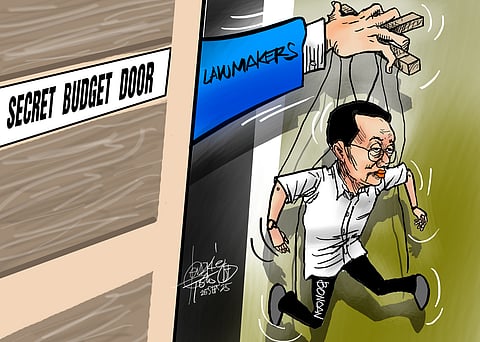
- NEWS
- the EDIT
- COMMENTARY
- BUSINESS
- LIFE
- SHOW
- ACTION
- GLOBAL GOALS
- SNAPS
- DYARYO TIRADA
- MORE

Lawmakers cannot dictate what goes into the National Expenditure Program. Yet, Manuel Bonoan, former DPWH chief, admits there was a “leadership fund,” a discreet hatch in the President’s budget where politicians could smuggle their projects long before Congress ever lays eyes on them.
Separation of powers, the subtle, almost invisible scaffolding that keeps power from bending to the quiet urgings of personal gain, exists to prevent lawmakers from influencing the executive on how to spend before their turn to approve.
Bonoan admits DPWH does exactly that.
The NEP may bear the DBM’s seal, but it rests on agency submissions. At DPWH, Bonoan decided which projects advanced, including those murmured into his ear by legislators.
He called it consolidating suggestions. To critics, it looked less like consultation and more like collusion, a budget shaped not by public need but by private cuts.
Former DPWH engineer Henry Alcantara, styling himself a whistleblower, declared the scheme plain: a quarter of each project diverted to its political mid wives. Five percent, 15 percent. Seized in advance once the NEP lay safely in ink.
Whether Alcantara’s sums were precise or not, the slush handle functioned as a lever for political gain. By “consolidating” such requests, Bonoan opened the treasury to misuse. Did Bonoan scrutinize whether they were legitimate public projects? Were there safeguards recorded? Earnest attempts at restraint?
If Alcantara’s figures are right, then who pocketed the quarter skimmed from each project? Did it enrich Bonoan’s men? The Senate hearings leave the answer almost palpable. Did it enrich him? Pressures there surely were, spoken or implied, and in navigating them, Bonoan’s choices balanced ambition, caution, the limits of his discretion.
By neither objecting nor abstaining, Bonoan left the impression that he had no quarrel with how the fund was run, an omission that, to critics, looked perilously close to complicity.
DBM Secretary Amenah Pangandaman admits she cannot verify every DPWH item. In other words, no one checks if these inserted projects are real or necessary or merely overpriced conduits for graft.
By the time the GAA passes, billions are effectively pre-approved for questionable ends. Congress can inflate the sums or add new items, and Bonoan’s “consolidation” provides the only veneer, legal in appearance, with no adult in the room to stop the machinery of abuse.
And what about Senator Joel Villanueva? A little bird linked him to unprogrammed funds. He maintained the semblance of impotence, “I cannot act alone”, positioning himself as the appointed lamb, and insisting the allegations were impossible.
Yet Bonoan’s ecosystem exposes the lie: lawmakers, outwardly meek, can quietly nudge, inflate, and direct billions, conditions that left Bulacan under water and thousands of classrooms as hollow shells.
Pangandaman’s alibi, that she cannot vet every project for want of experts, is consistent with the law but functionally evasive. It concedes the flaw it seeks to excuse and, in that failure, she hands the public purse to thieves with her blessing.
